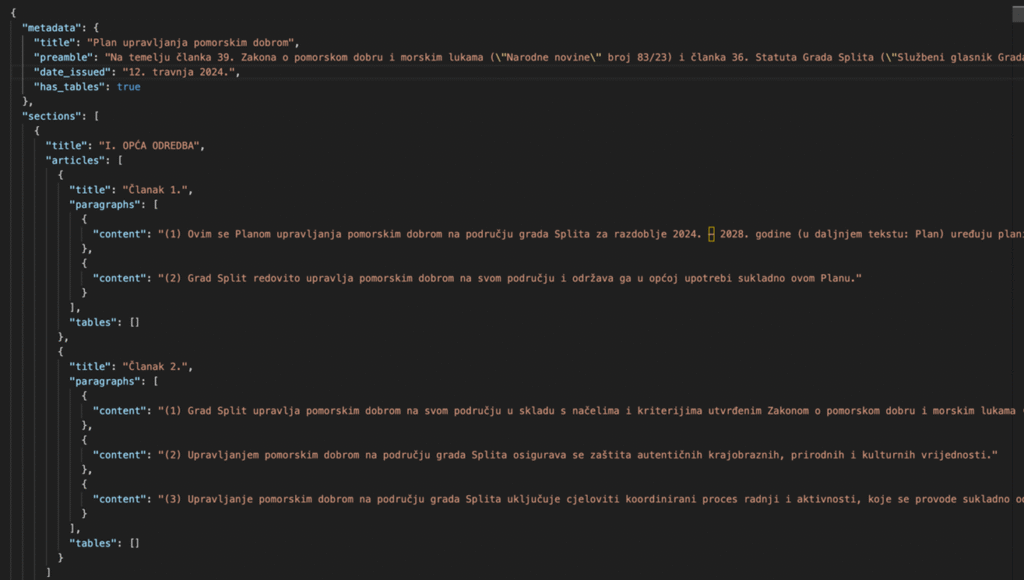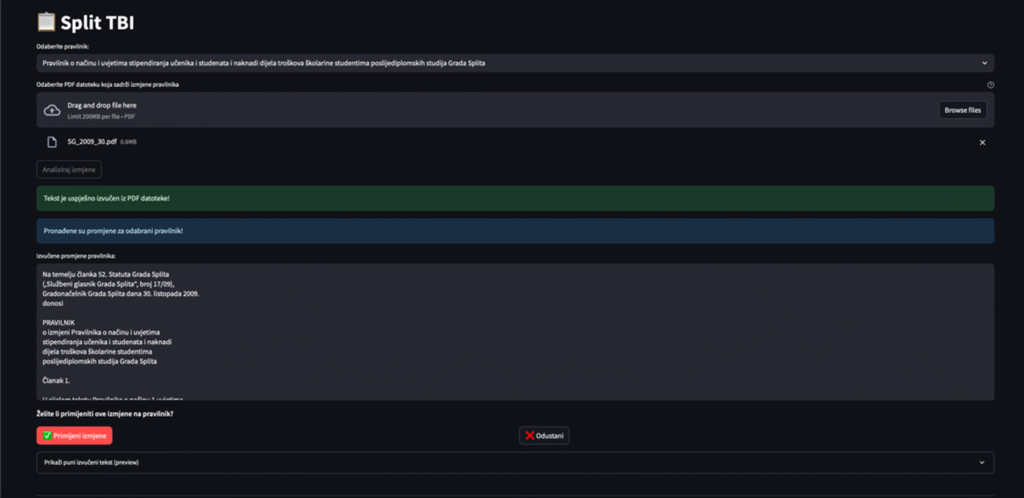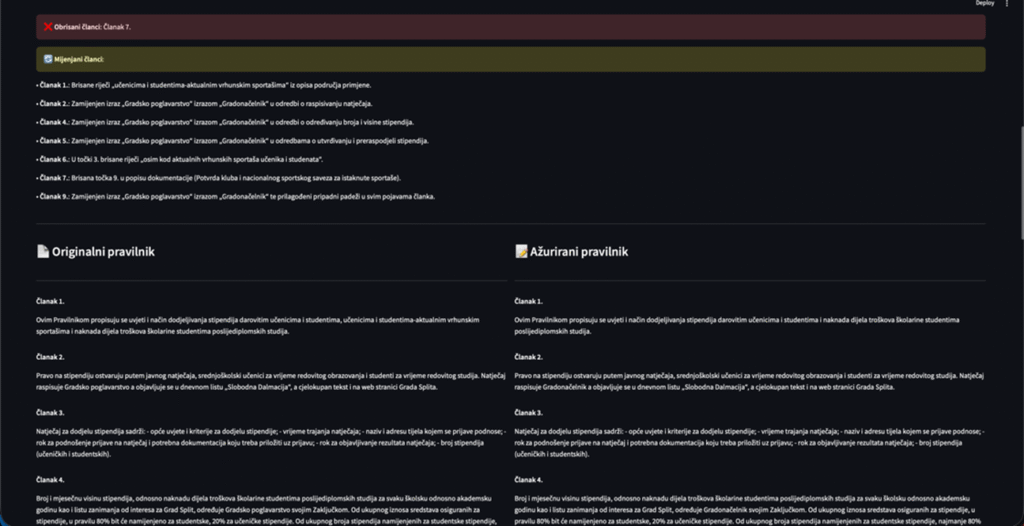Challenges
The city of Split, as the second largest urban center in Croatia, is increasingly oriented towards digital transformation in order to improve the work of public administration and improve the quality of life of its citizens. As part of the modernisation, the need for more efficient management of official documents, namely regulations and their amendments, was recognised. Creating updated, consolidated texts of the Rules that include all relevant changes from the Official Gazette of the City of Split proved to be a demanding and time-intensive task. Traditional approaches require manual work, are prone to errors and hamper transparency and the availability of up-to-date information. For this reason, the need to introduce a digital solution that can automate this process, reduce the need for manual processing of documents and enable accurate and quick generation of consolidated texts has been recognized.
Solution
Within the TBI (Test Before Invest) service for the City of Split, a prototype system for automated processing of regulations and their amendments was developed and evaluated. The project represents a research step forward in the application of large language models (LLM) with the aim of automated generation of updated, consolidated texts of official regulations. The focus was on exploring the possibility of integrating structured data from the amendments with the unstructured textual content of the original regulations.
The prototype was developed as an interactive web application using the Streamlit development tool, which enabled a simple user interface available through the browser, without the need for technical pre-knowledge. Key components of the system include OCR technology for recognition of text from PDF documents and application of LLM models (GPT-4o and GPT-5) for analysis, structuring and generation of updated texts. The system uses a modular architecture that covers all stages of processing: from identifying content, performing text and applying changes, to displaying results.
In cases where regulations contain complex table data, a combined approach, OCR for textual parts and LLM models for table processing were applied. After processing, the content is converted to a structured JSON format and forwarded to the language model that generates the final consolidated text. The interface allows users to upload the policy and related changes, as well as a comparison of the original and updated version, ensuring transparency in the presentation of the changes.
Demonstration of functionality was conducted through testing of multiple scenarios with different types of policies. The results showed that the prototype can also process more demanding documents, including those with tabular content, and successfully integrate the changes into a coherent and uniform consolidated text. This confirmed the technical feasibility of the solution, as well as the potential of LLM technology in the digitalisation of administrative processes within the city administration.



Results and Benefits
The implementation of the TBI project for the City of Split demonstrated the technical feasibility of using large language models (LLMs) in the automated processing of official regulations and their amendments. The developed prototype has successfully demonstrated that with the combination of OCR technology and LLM models, relevant changes can be precisely identified and integrated into the consolidated text of the rulebook, including complex contents such as tables. The results achieved show a number of concrete benefits:
- Accelerating the process of creating consolidated texts: Automation allows significant time savings compared to manual document processing.
- Reducing errors and increasing consistency: The system reduces the possibility of human error and ensures consistency in the application of the changes.
- Increasing the availability and transparency of information: Users have a clear view of all changes, with a comparison of the original and updated text.
- The basis for further digital transformation: The project represents an initial step in the development of an advanced digital assistant to work with legal regulations, which can also be applied outside the city administration.
Lessons learned
During the development and testing of the prototype, key challenges and opportunities for improvement were identified:
- Complexity of the table contents: Some regulations contained tables with merged cells and multi-page content, making processing difficult. Standardisation of tabular formats for future documents is recommended.
- Limitations in the processing of visual elements: Image attachments, schematics and drawings are so far not covered by automatic processing, and their inclusion requires additional tools and further development.
- Importance of user interface customization: In the next phase, the system should also include an interactive chatbot, which would allow users to easily ask questions and search the policy.
- Risks and limitations: The quality of the results largely depends on the quality of the input data, and challenges such as atypical tables can affect the accuracy of the results. It is also necessary to take into account system maintenance costs and the level of digital literacy of end-users.
Conclusion
The ‘Test Before Invest’ project, carried out in cooperation between the City of Split and the EDIH Adria consortium, has successfully demonstrated how the use of artificial intelligence, specifically large language models, can significantly improve administrative processes in local self-government. The developed prototype system for the automatic creation of consolidated texts of the rulebook confirmed the technical feasibility of the solution, identified the key challenges and enabled the adoption of concrete recommendations for further development. This project has shown that LLM technology, combined with a carefully designed user interface and process architecture, can ensure faster, more accurate and more transparent processing of official documents. Successful implementation opens the space for building a scalable and user-oriented digital assistant for regulation management, applicable not only in city administrations, but also in other public institutions. EDIH Adria continues to support the City of Split and other local self-government units as well as small and medium-sized enterprises in their digital transformation efforts, helping them to take advantage of advanced technologies for more efficient, transparent and sustainable management of their resources.






